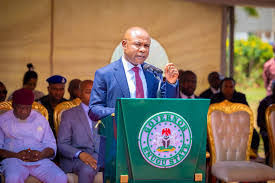It is difficult to talk about the menace of insecurity across the country and not risk sounding like a broken record. We have complained and wailed about the seeming half-hearted or total lack of will to end the reign of terrorists, bandits and armed non-state actors in the last 10 years.
We hit an all-time low during the lackadaisical reign of President Muhammadu Buhari. For Buhari, the fight against insecurity was tainted by religious bigotry and ethnic sentiment.
Buhari’s government spent more time making up excuses for murderers and defending mind-boggling wanton raids, destruction and killings across the country for clannish and narrow interests.
Whereas it was okay to send tanks and armoured vehicles to quell infractions in other parts of the country, he was proffering excuses and rationalizing the activities of bandits and killer-herders from the north.
In all of his eight years in office, he kept rationalizing and making excuses for killer-herders whose expansionist ambitions were all too clear for all to see. Buhari would go to Benue and Plateau states to blame farmers for not being good hosts to their killer-guests who brazenly sacked communities and displaced them from their ancestral homes.
We also warned at the coming of the Tinubu regime that for him to succeed where his predecessor failed, Tinubu must take a different approach. He must be dispassionate about the fight and be prepared to rout these murderers from from across the country. Tinubu was told that the era of Buhari using deodorant against infractions from his kith and kin while using insecticides on infractions from other parts of the country must end.
Tinubu was also warned that he should try to sack all those who have link one way or the other with these killers who have infiltrated the government, if he wants to succeed.
While Tinubu has been making some progress in the fight far more than his predecessor, he rather strangely, still keeps a man that is known for his long open relationship with bandits as his Minister of state for defence. Of all ministries!
The current Zamfara State’s governor, Dauda Lawal, has publicly accused former governor Bello Matawalle of having ties with bandits terrorizing the state. According to Lawal, Matawalle’s alleged involvement includes paying ransoms and hosting bandits at the government house during his tenure.
Gov Lawan, for heaven’s sake, is supposed to be the chief security officer of the State and so should understand the weight of his allegations against his predecessor.
Therefore, we should expect that a government that is desirous of ending the menace should be speaking with the governor. This is outside of the realm of politics and politicking. Ignoring Lawal while carrying on as though the allegations against Matawalle are inconsequential is to say the least, disappointing and not a good optics for this government.
These claims have sparked controversy and raised questions about Matawalle’s relationship with criminal elements in the region.
These accusations highlight the ongoing struggle against banditry in Zamfara State, with kidnappings, killings, and ransom payments becoming all too common.
The least the Tinubu regime should do is call Matawalle to clear himself and explain his relationship with these vandals and bloodthirsty demons, that is already public knowledge.
Sometime in 2018
former chief of army staff, General Theophilus Danjuma, accused soldiers of colluding with herdsmen to cause havoc across the country.
Danjuma’s allegations did not indict the corporate establishment of the armed forces, but political leadership of Buhari.
Danjuma was indicting the Commander-in-Chief of the Armed Forces, because, as it appeared, the armed forces were being used to promote and defend the interest of President Buhari’s kinsmen.
Danjuma alleged that the military was complicit in the violence, particularly in Taraba State.
Danjuma’s statement was made during a speech at the Taraba State University, where he also urged Nigerians to defend themselves against armed bandits.
Six years later, General Danjuma is at it again. This time, he is charging the military to end the insecurity and killings in the country.
Danjuma, who spoke in Abuja last Tuesday at the public presentation of a book titled “Big Boots: Lessons from My Military Service,” authored by Maj. Gen. Solomon Udounwa (retd.), said the military has no excuse not to end insecurity once and for all.
Danjuma, who chaired the occasion said, “The number one problem today is security. We must end the pandemic and stop the killings that are going on in our country as soon as possible. Those of you who are still serving have no excuses; absolutely no!”
Responding, the Chief of Defence Staff, Gen. Christopher Musa, said the military was positioned and working tirelessly to restore peace across the country.
Musa’s disposition to the elder statesman’s challenge is one that shows humility, respect for seniors and a sincere desire to achieve results. In the past, a statement like this would either have been scorned or completely ignored.
Musa reportedly said, “Let me at least also mention to our distinguished chair that we are positioned, willing, dedicated, and committed to ensuring that we restore peace and security in our own dear country. We shall not be deterred. There are going to be challenges, yes, but that’s why we’re here. I want to assure you that we have learned a lot from your record, very, very distinguished senior officers who have modeled us all through the years. We cannot afford to fail and we will not fail.”
This perhaps explains the significant progress so far made and for which we must give kudos to President Tinubu and the military.
For the first time since after President Goodluck Jonathan, there is again a visible desire to rout these murderous groups. Major kingpins are being targeted and neutralized. This was not the case under Buhari when Matawalle and his likes were paying those bandits as well as promoting spurious deradicalisation, rehabilitation and reintegration exercises.
In May, the Minister of Defence, Muhammad Badaru noted that the synergy among the Service Chiefs and sister agencies, something that was absent during the Buhari regime where inter-agency rivalry was at its peak, led to the killing of over 9,300 bandits and insurgents, while 7000 had since been arrested in the last year.
Recently, the Nigerian Army killed a notorious bandit leader and arms supplier, Kachalla Halilu Sububu, in a major operation in the northwest as well as rescued 13 kidnapped students in Kaduna.
Sububu, a key figure in the region’s banditry, operated a large mining site in Dan-Kamfani, Anka Local Government Area, and owned thousands of cattle in the infamous Sububu Forest.
The operations were conducted by troops of Operation Hadarin Daji, as disclosed by the Federal Ministry of Information and National Orientation. It stated that the operation also resulted in the elimination of another terrorist, Sani Wala Burki, in a joint effort in Katsina.
President Tinubu also praised the military high command, intelligence agencies, and troops for their remarkable efforts, effective collaboration, and unwavering dedication, which have led to recent commendable successes.
Nigeria belongs to us all and therefore we must continue to strive for those things that would uphold her unity and promote our collective interests and progress.
There is still a lot more work to be done but for the military this is to thank them for their achievements so far and may God keep them and protect them from harm as they put their lives in danger just to secure us. They must be adequately taken care of and their needs provided for. The era where the military high commands were reaping the nation while benefiting their selfish interests should be over.
And like Gen Danjuma has said, security is the major priority and must be treated as such. It’s only in a secure environment that growth and development can meaningfully take place.
God bless Nigeria.
.png)
 2 hours ago
6
2 hours ago
6








 English (US) ·
English (US) ·